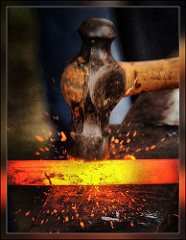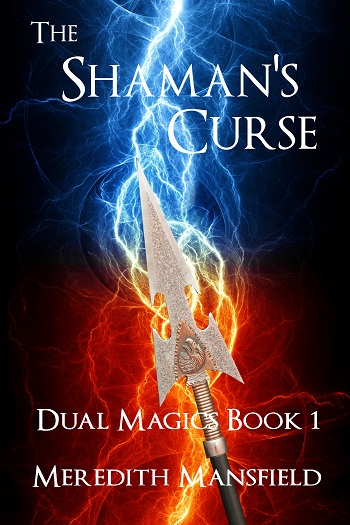Fantasy Careers is a blog series where I interview characters from fantasy books about their interesting jobs and unusual careers. Interested in taking part? Drop me a line through my contact form.
Elise: Today, I like to welcome Vatar of the Lion Clan of the Dardani to Magic Writer. Vatar is here to tell us about his job as a smith. Tell us a bit about where you live, Vatar.
Vatar: I was born out on the plains, among the Dardani, but now I spend about half the year in Caere. That’s the biggest city along the sea coast. I still go out to my people in the summer, but it just isn’t practical to transport enough materials out onto the plains for a smith to stay busy all year. And . . . I have family here now, too.
Elise: What does your job as a smith involve?

Vatar: Mostly I work with iron and steel, though we’re all trained as apprentices to work with other metals as well. I don’t mind working with bronze and copper, but I don’t much care for the fiddly work with gold and silver. There are other smiths who’re much better at that than I am.
Elise: So do you have a particular area of expertise?
Vatar: Yes, I’m a blade smith. I make knives, arrowheads, and spear points for the most part, though I’ve also trained with the master swordsmith. I can make other things, of course. I made that gate you just came through, the one with the charging lion in the center. That’s my master’s mark as well as the symbol of my clan. An advertisement, if you like, though I worked protection into it with every hammer blow. But my primary business is in blades.
Elise: I love the gate, it’s impressive work. I noticed the beautiful lion as I came in. What’s a typical day in your job involve?
Vatar: First thing in the morning, I have to build up the forge fire, adding charcoal and using the bellows to get it really hot. If I had an apprentice, this would be his job, but I don’t, yet.
Then, I can start heating the pieces I’m going to work on. When the metal is yellow-hot, it’s ready to work on my anvil, pounding it into the shape I want. There’s not much need to quench and reheat the smaller blades as I work, but they all do need a final annealing to keep them from being brittle. Then, of course, there’s grinding the edges to make them sharp.
It can be hot, sweaty work, but, fortunately, there’s usually a good breeze here, near the ocean. That helps.
Spear points and arrowheads I usually sell just as they are. There’s not much market for those items here in the city and they’re easier to transport out to the plains without shafts. I do add hafts to the knives I make. That’s work I usually do in the evenings or during thunderstorms. You do not want to be in a forge full of iron tools during a thunderstorm.
Elise: That’s really interesting. I’ve seen a glassmaker at work, but never a metalsmith. I can imagine it’s hot work at times. What’s your favourite part of the job?
Vatar: I love the song of the iron under my hammer—and the fiercer song of the steel, too. No one else hears that music. Well . . . it’s not exactly melodic, but it’s music to me. And it helps the iron or steel to tell me where to strike next with my hammer. Sometimes, I sing along. When I do, sometimes the steel turns into something a little . . . more.
You see my spear over there, leaning against the wall? I made that and several others to hunt a pair of Forest tigers that were threatening my people and sang while I worked. None of those blades have ever shown a speck of rust or needed to be sharpened. I’d trust that spear to defend me and mine against anything. Defense and protection. That’s what I sang while I worked on that spear and it’s never failed me.
Elise: It sounds like this job is a real vocation. You enjoy the work, I take it?
Vatar: It’s funny. When I was a boy, before I came to Caere, I’d always thought that I’d grow up to be one of the herdsmen, tending the cattle and horses, like Pa.
But now, I honestly can’t imagine doing anything else. Making useful or sometimes beautiful things with my hands, knowing that the things I make will last, maybe for generations . . . . well, that may not be as adventurous as following the herds and defending them from predators, but it’s a lot more satisfying.
And, somehow, more than enough adventure seems to find me, anyway. I don’t really need more.
Elise: Creating things is very satisfying work. So, you said you don’t have an apprentice yet. Do you work with anyone else at all?
Vatar: Not . . . exactly. Someday, I’ll likely train an apprentice or two of my own. Other than that, most smiths work alone except on really large projects.
But my cousin, Arcas, and I are business partners. He’s a merchant. I make the blades and he trades them. He’s the one who made a deal with the Modgud, a people on the far side of the plains, to trade my blades and points for the gold they find on their plateau. That’s the most profitable part of our business.
Elise: Did you train as an apprentice yourself, at first?
Vatar: Yes, I apprenticed with my Uncle Lanark for two years, until I could make a piece that would impress the master smiths. That included some training at the guildhall, too, of course. After I became a master smith, I still studied with the Master Bladesmith and the Master Swordsmith to learn the fine points of my specific craft.
Elise: Did your uncle and father agree between them that you would train as a smith rather than working with the herds then? Or was it your choice?
Vatar: When I first came to Caere, I had no intention of staying. But it turned out my Pa and Uncle Lanark had been planning something for a while. You see, the Dardani only work bronze and copper. We had to trade for all of our iron and steel from Caere. We even had to take any weapons or tools that needed repairs back to Caere—once a year—for repairs. Pa had been trying to change that for years and Uncle Lanark was willing to help, but the Smiths’ Guild refused to allow him to take a Dardani apprentice.
But, they couldn’t keep him from training his own sister’s son—me. It was still my choice, of course. But . . . well, that choice was pretty much made the first time I heard the iron singing under my hammer.
Also, my cousin Arcas—Uncle Lanark’s son—hadn’t turned out to be a very good apprentice in the Smiths’ Guild. Everyone knew he’d do much better as a merchant. When I took his place as Uncle Lanark’s apprentice, he apprenticed with his uncle—his mother’s brother—in the Merchants’ Guild. So, that all worked out.
Elise: Ah, that does indeed sound like everything worked for the best, for both of you and your families. So, on a lighter note, do you have any amusing or interesting stories about your job?
Vatar: Um . . . you don’t really joke around much in a smithy. Too many ways to get hurt. Now, if you want a scary story, or at least one that started that way . . .
There was the time I was working in my forge out on the plains, so absorbed in the work I didn’t even notice the clouds rolling in. Thunderstorms can come up really fast on the plains. It wasn’t until I heard the first roll of thunder that I looked up from my anvil.
I knew I needed to close up the forge and get out of there, but people outside the forge were looking up at the top of the chimney so I stepped outside to see what they were looking at. There was an ephemeral violet light playing around the top of the chimney. In the city, we call that Tabeus’s fire and the big bell at the Smiths’ Guildhall would have been ringing to warn all smiths to get out of their forges because Tabeus’s fire is a warning of an imminent thunderstorm. But, of course, there isn’t any warning bell among the Dardani, so I had no way of knowing. The Dardani call it Spirit fire and the herdsmen understand its significance, too. I understand you have a different name for it where you come from—Saint Elmo’s fire, or something like that.
None of us knew about what happened next, though. This . . . ball of light came zipping in, hovered for a moment, and then exploded. No one knew what that was, though, of course. It wasn’t until I got back to the city—eventually—that I learned about ball lightning. Good thing it’s rare is all I’ve got to say.
But that episode led to . . . well, the shaman had had a vendetta against me for a long time—which is how I ended up in Caere in the first place. So, he tried to use that to turn the Dardani against me. I had to challenge him to an Ordeal to prove myself. And that led to both some of the worst things that have ever happened to me and to the very best. So, I guess it all worked out in the end.
Elise: Goodness, that sounds scary. I’m lucky to live in a temperate area myself–the occasional summer thunderstorm, but that’s about it. I’d love to hear more of your story, but I’m afraid I’m out of time here. One final question, if I were interested in your wares, what item do you think would be suitable for me?
Vatar: Most smiths would try to offer you something for your home. Perhaps an ornate bit of ironwork formed into a hook.
Me, I think everyone should be able to defend themselves if the need arises. A handy little dagger, with an ornate hilt, that could slip into your belt and look like a harmless piece of jewelry, perhaps?
Elise: Mmm, sounds like a good idea. Let’s have a chat before I go–you might have a deal!
Learn more about Vatar in The Shaman’s Curse by Meredith Mansfield
The Shaman’s Curse
Vatar risked his life to try to save his friend–and failed.
Now he has an implacable enemy in the vengeful shaman, who blames Vatar for the death of his only son. In his isolation, Vatar finds some comfort in daydreams. He knows the strange girl he sometimes imagines is just that–a dream. She’d better be.
Because, if she’s real things could get even worse for Vatar. The accepted magic of Vatar’s plains tribe wouldn’t enable him to see or communicate with a girl he doesn’t even know–or know where to find. That would be more like the magic passed down in certain, closely-guarded bloodlines among the ruling class of the coastal cities. And that’s bad. Very bad.
Unlike their own, Vatar’s people think the city magic is evil. If the shaman ever found out, it could be the weapon he needs to destroy Vatar. And yet, finding a way to accept the other side of his heritage may be the only way Vatar can ultimately defeat his enemy.
The two kinds of magic have always been totally separate. Until now.
Professionally, I’ve been a financial analyst and a visual basic programmer. I also have a paralegal certificate, although I’ve never worked in that field. It’s anybody’s guess what I’ll be when I grow up.
Imagining stories and writing have always been an important part of my life. It’s one I’ve finally could get serious about while I cared for my mother who had Alzheimer’s disease.
Connect with Meredith: Blog, Twitter, and Facebook
Image Licence: https://creativecommons.org/licenses/by-nc/2.0/t



Awesome interview! I’ve always been interested in smithing… Sounds like hard work, though! Maybe someday I’ll be able to give it a try.
I’d love the chance to give it a try someday as well!
Great interview guys!
Thanks!